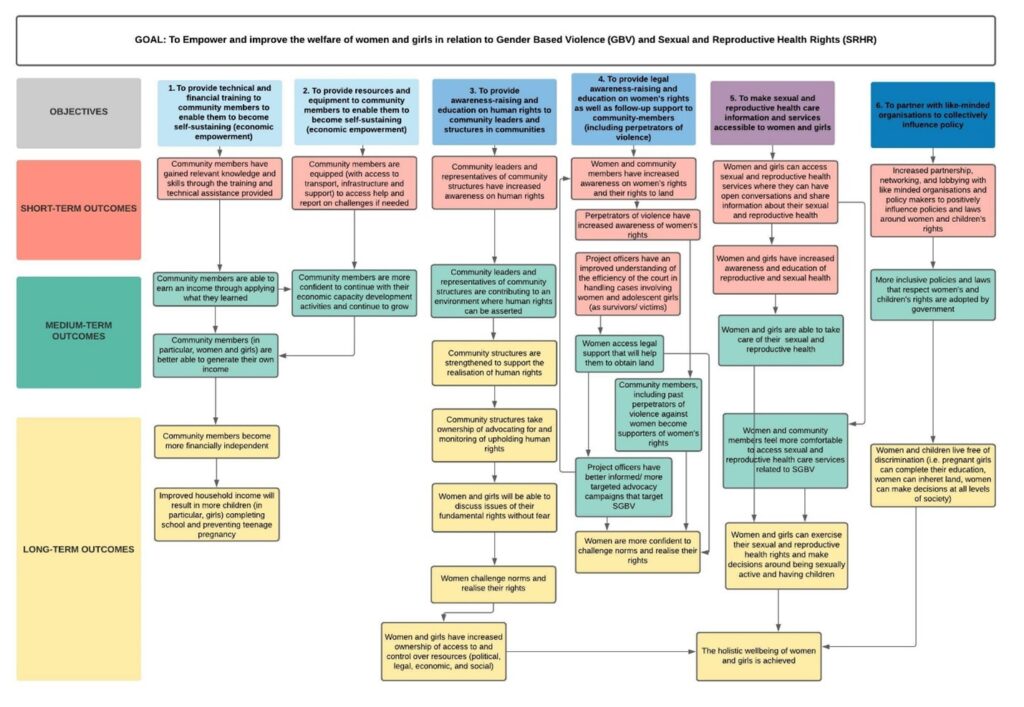What We Do
There is great need in Bo District, especially in the WAVES targeted communities and its surrounding communities. WAVES is well positioned to make a significant contribution to addressing several key issues affecting women and girls.
Within the framework of WAVES approach, we organize our work under the following intervention areas:
- Sexual and Gender based violence–through awareness raising on gender-based issues including harmful traditional practices (FGM/C, early forced marriage), and sexual reproductive health and right issues.
- Violence Against Women and Girls (VAWG)
- Sexual and Gender Based Violence (SGBV)
- Sexual Reproductive Health Rights (SRHR)
- Gender Equality and Social Inclusion (GESI)
- Women and Girls Empowerment- village saving and loan (VS&L) scheme and small-scale agricultural activities.
- Education – advocacy and support to girls’ rights to education, Increased community awareness
- Nutrition and health
- Governance, Rule of law and Access to justice
- Women’s Access to right, ownership of property and decision making in the community Peace building and Human Rights (Especially women and children)
- Youth Empowerment
- Good Governance – especially women in leadership
We work with women, adolescent girls (in and out of school 10 to 19 years), to address:
- Teenage pregnancy
- Early marriage.
- Female genital mutilation (FGM/C)
- Menstrual hygiene management.
- Sexual and Gender based violence against girls.
- Inclusion of Pregnant Girls in Schools (pregnant girls to school)
- SRHR
- Social and economic empowerment of women and girls.
Our Objectives will be achieved through the following actions.:
- Awareness raising on sexual and gender-based violence issues including harmful traditional practices (FGM/C, early forced marriage, teenage pregnancy) and sexual reproductive health and right issues (SRHR).
- Education – Advocacy and support to girls on their rights to education.
- Social empowerment of adolescent girls through the establishment of safe spaces.
- Economic empowerment of adolescent girls 16 – 19 years of age by using the established safe spaces through skills training in marketable vocational skills and SMEs.
- Establishment of village savings and loans associations (VSLAs) for caregivers/parents of girls in school so that they can support their children schooling.
- Awareness raising or advocacy with focus on promoting sex education at community and chiefdom levels through workshops, drama groups or theatres.
- Building girls movement.
- Inter school Debate competition on violence against girls (VAG).
- Radio programs on SGBV.
- Education on international and national legal instruments.
- Training/workshops on Comprehensive sexuality education.
- Field trips to services available in communities.
- Linking girls to service providers.
- Inter-generational dialogue session (IGD).
- Training on message development.
- Production of information, education and communication materials (IEC) with key messages for girls.
- Support girls to plan and undertake activities.
- Provide Counseling services for survivors of violence.
- Psychosocial support to survivors of violence.
- Provide girls with mentorship to take lead in community activities.
- Provision of basic learning materials to more vulnerable girls.
Beneficiaries of WAVES:
The beneficiary groups that WAVES target and works with include:
- Vulnerable Women & Adolescent girls
- Communities stakeholders – traditional leaders, parents, school authorities etc
- In school and out of school Youth, women and girls
- Children at risk and vulnerable to RAPE/ and ABUSE
- Parents of children engaged in petty trading
- Vulnerable women and women’s groups
- Local Councilors and Ward Committee Representatives
- Other vulnerable and excluded men and women in the communities
- Law/ policy Makers
- Perpetrators
- Health care Workers
- Religious leaders – Imams/Pastors
- Clique/Ghetto boys
- PLWDs
Our Approach
- Empower women and girls
- Engage/Support evidenced based and citizen led advocacy
- Change social norms
- Build political will, legal and institutional capacity to prevent and respond to VAWG
- Advocate for Reform security and justices’ sectors
- Support national networks, lobbying for change
- Provide /advocate for comprehensive services
- VSLA
- Strengthen social assets and safety nets
- Secure funding and work with other WRO’s /WLOs delivering services,
- Support and work with family support units in police and social welfare
- Promote/Practice good Data management
- Partnership and collaborative work
- Engaging influencers (community and religious leaders, teachers, parents and youth) in behavior change communication strategies
- Capacity building – trainings
- Creating/strengthening linkages, connections and referral pathways
- Data collection and management
- Media engagement
- Networking, Partnership and collaborative work
- Advocacy/lobbying for action that will promote women and girls’ SRHR
- Feedback mechanism
- Strengthening the FMCs

